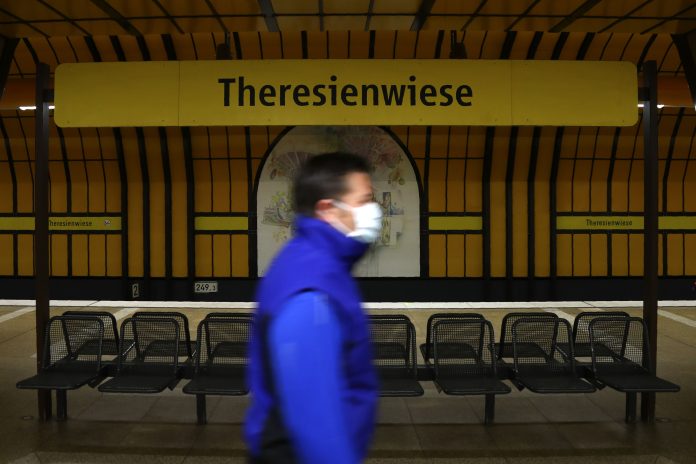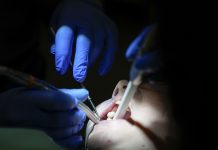
Spain canceled the Running of the Bulls in July, the U.S. scrapped the national spelling bee in June and Germany even called off Oktoberfest, making it clear Tuesday that the effort to beat back the coronavirus and return to normal could be a long and dispiriting process.
Amid growing impatience over the shutdowns that have thrown millions out of work, European countries continued to reopen in stages, while in the U.S., one state after another — mostly ones led by Republican governors — outlined plans to gradually get back to business in the coming days.
The push to reopen has set off warnings from health authorities and politicians that the crisis that has killed well over 170,000 people worldwide is far from over, with deaths still mounting, and that relaxing the stay-at-home restrictions too quickly could enable the virus to come storming back.
The economic damage mounted as stocks dropped around the world and oil prices suffered an epic collapse.
A barrel of U.S. oil to be delivered in May was $5.38 in morning trading, or about the cost of a fancy latte. A day earlier, the price was negative for the time ever, with the market so glutted with oil and running out of places to store it that sellers were essentially offering to pay buyers almost $38 a barrel just to take it off their hands.
Meanwhile, U.N. leaders called for efforts to ensure that all people have access to testing, medical supplies, drugs and future vaccines, especially in developing countries where virus cases are rising.
African officials have been outspoken about the need for medical supplies across the 54-nation continent, where health care systems are weak and could become overwhelmed.
Even under a best-case scenario, Africa will need $44 billion for testing, personal protective equipment and treatment of coronavirus, according to a U.N. report. The worst-case scenario estimates $446 billion. The continent has recorded more than 1,100 deaths.
In Europe, Denmark, Austria, Spain and Germany began allowing some people back to work, including hairdressers, dentists and construction workers. and some stores were cleared to reopen.
Spain, which is among the worst-hit countries, will also begin allowing children out of their homes for brief periods next Monday. Denmark’s Tivoli Gardens, the Copenhagen amusement park that inspired Walt Disney, will reopen on May 11.
In Austria, Chancellor Sebastian Kurz said all shops will be up and running at the beginning of May and restaurants in mid-May. He said the government will watch closely and will “pull the emergency brake if that is necessary.”
But in an indication that it will be a long time before life returns to normal, Spain canceled its Running of the Bulls in Pamplona, the more than 400-year-old event made world-famous by Ernest Hemingway’s 1926 novel “The Sun Also Rises.” It was also called off during the Spanish Civil War in the 1930s.
The U.S. canceled the Scripps National Spelling Bee. The competition has been held since 1925 and was scrubbed only once before — in 1943-45, because of World War II.
“Our hearts go out to the spellers who won’t get their final shot at winning because of the pandemic and the difficult decisions it is prompting us to make,” said Paige Kimble, executive director.
The U.S. has recorded more than 42,000 deaths — the highest in the world — and nearly 800,000 infections. according to a Johns Hopkins University count, though the true figures around the world is believed much higher, in part because of limited testing, difficulties in counting the dead and efforts by some governments to hide the extent of their outbreaks.
Germany called off the world-famous, centuries-old Oktoberfest beer festival in Munich, which draws about 6 million visitors each year in the fall.
“We agreed that the risk is simply too high,” Bavarian governor Markus Soeder said.
In Italy, Premier Giuseppe Conte confirmed that businesses can start reopening on May 4 but doused any hopes of a full end to the country’s strict lockdown.
“Many citizens are tired of the efforts that have been made so far and would like a significant loosening of these measures, or even their total abolition,” Conte said on Facebook. “A decision of that kind would be irresponsible.”
In the U.S., some states, including Georgia, South Carolina, Tennessee, West Virginia and Colorado, announced plans to begin reopening in stages in the coming days, despite the concerns of health officials. Boeing and at least one other American heavy equipment manufacturer resumed production.
But governors and local officials from many other states said they lack necessary testing supplies and warned they could get hit by a second wave of infections.
And the experience in places like China makes it clear that businesses will not necessarily spring back to life once they get the all-clear. Customers may be hesitant to go out, and some businesses may not see any financial sense in opening up right away.
Kristin Allin, who with her husband owns Bread and Butterfly restaurant and Proof Bakeshop in Atlanta, said they were caught off guard when Georgia Gov. Brian Kemp announced Monday that restaurants could reopen for dine-in service within a week.
“We didn’t expect to have this conversation at all until probably the end of May at the earliest, so having it so soon is a shock,” Allin said, adding that they still do not plan to open right away and could remain closed for a month or more.
“I think most of our customers are not ready to venture out yet,” she said.
New York Mayor Bill de Blasio said that governors easing off restrictions had better have the facts on their side or they could trigger a resurgence of the virus beyond their states’ borders.
“If some of these reopenings are done the wrong way, it’s going to affect all of us,” de Blasio said on CNN.



















